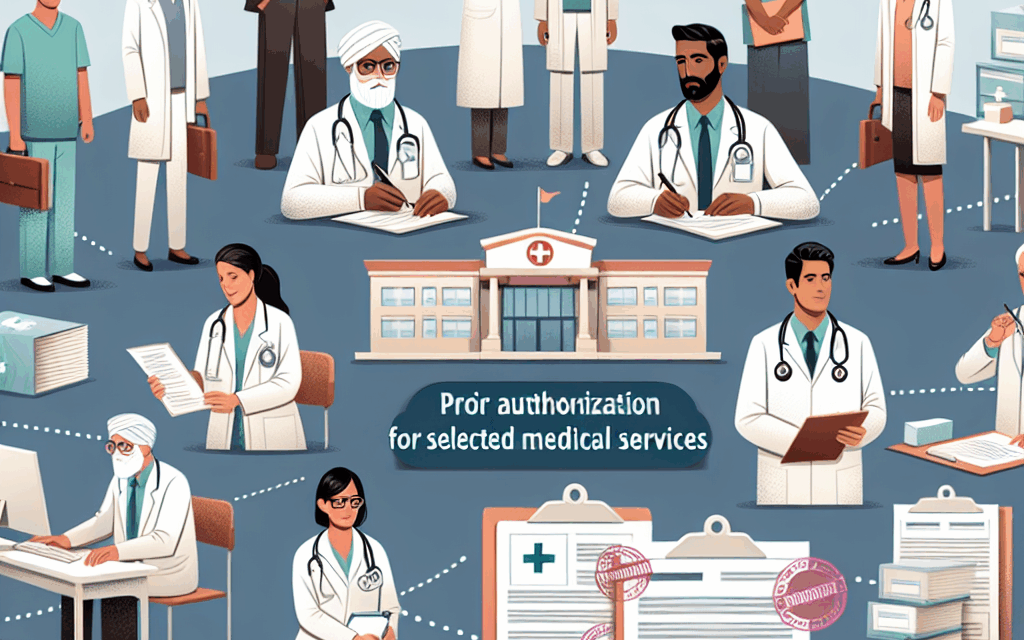CMMI Introduces Prior Authorization for Select Medicare Services
The Centers for Medicare & Medicaid Innovation (CMMI) has recently introduced a new initiative aimed at streamlining the prior authorization process for select Medicare services. This move is part of a broader effort to enhance the efficiency of healthcare delivery while ensuring that patients receive the necessary care without unnecessary delays. In this article, we will explore the implications of this initiative, its potential impact on healthcare providers and patients, and the broader context of prior authorization in the Medicare system.
Understanding Prior Authorization in Medicare
Prior authorization is a cost-control mechanism used by insurance companies, including Medicare, to determine whether a specific service or treatment is medically necessary before it is provided. This process requires healthcare providers to obtain approval from the insurer before proceeding with certain services, which can include diagnostic tests, surgeries, and specialty medications.
The primary goal of prior authorization is to prevent unnecessary or inappropriate medical services, thereby controlling costs and ensuring that patients receive care that is both effective and necessary. However, the process has often been criticized for creating barriers to timely care, leading to delays in treatment and increased administrative burdens for healthcare providers.
The Role of CMMI in Medicare Innovation
The CMMI was established under the Affordable Care Act (ACA) to test innovative payment and service delivery models that aim to reduce costs while improving the quality of care. By introducing prior authorization for select Medicare services, CMMI is taking a significant step towards addressing the challenges associated with the traditional prior authorization process.
Through this initiative, CMMI aims to create a more streamlined and efficient prior authorization process that minimizes delays in patient care while ensuring that services are medically necessary. This approach aligns with CMMI’s broader mission to promote value-based care and improve patient outcomes.
Key Features of the New Prior Authorization Initiative
The new prior authorization initiative introduced by CMMI includes several key features designed to enhance the efficiency of the process and reduce administrative burdens on healthcare providers. These features include:
- Targeted Services: The initiative focuses on specific services that have historically been associated with high rates of prior authorization requests, such as advanced imaging and certain surgical procedures.
- Streamlined Processes: CMMI is implementing standardized processes and criteria for prior authorization requests, which are intended to reduce variability and confusion among providers.
- Real-Time Decision Making: The initiative aims to leverage technology to facilitate real-time decision-making, allowing providers to receive immediate feedback on prior authorization requests.
- Patient-Centric Approach: The new process emphasizes the importance of patient engagement and communication, ensuring that patients are informed about their treatment options and the prior authorization process.
- Data-Driven Insights: CMMI plans to utilize data analytics to monitor the effectiveness of the prior authorization initiative and make necessary adjustments based on real-world outcomes.
Targeted Services and Their Importance
By focusing on specific services that have historically faced challenges with prior authorization, CMMI aims to address the most pressing issues within the Medicare system. For example, advanced imaging services, such as MRIs and CT scans, often require prior authorization due to their high costs and potential for overuse. By streamlining the prior authorization process for these services, CMMI hopes to reduce delays in diagnosis and treatment, ultimately improving patient outcomes.
Additionally, certain surgical procedures may also be included in the initiative, as these often require extensive documentation and justification for approval. By simplifying the prior authorization process for these services, CMMI aims to alleviate the administrative burden on healthcare providers, allowing them to focus more on patient care rather than paperwork.
Impact on Healthcare Providers
The introduction of prior authorization for select Medicare services is expected to have a significant impact on healthcare providers. While the initiative aims to streamline the process, it also raises several concerns and challenges that providers must navigate.
Administrative Burden and Workflow Changes
One of the primary concerns among healthcare providers is the potential for increased administrative burden associated with the new prior authorization process. Although CMMI aims to streamline the process, providers may still face challenges in adapting to new workflows and requirements.
Healthcare providers will need to invest time and resources into understanding the new prior authorization criteria and processes. This may involve training staff, updating electronic health record (EHR) systems, and developing new protocols for submitting prior authorization requests. As a result, providers may experience temporary disruptions in their workflow as they adjust to the changes.
Financial Implications
The financial implications of the new prior authorization initiative are also a significant concern for healthcare providers. While the goal is to reduce unnecessary services and associated costs, providers may face delays in reimbursement for services that require prior authorization. This can create cash flow challenges, particularly for smaller practices that rely on timely payments to maintain operations.
Moreover, if the prior authorization process is not effectively streamlined, providers may experience increased denials and appeals, further complicating their financial situation. It is essential for providers to stay informed about the new initiative and proactively address any potential challenges to mitigate financial risks.
Patient Experience and Access to Care
The introduction of prior authorization for select Medicare services has significant implications for patient experience and access to care. While the initiative aims to improve efficiency, it is crucial to consider how these changes will affect patients seeking medical services.
Delays in Treatment
One of the most significant concerns regarding prior authorization is the potential for delays in treatment. Patients may experience longer wait times for necessary services, particularly if the prior authorization process is not effectively streamlined. Delays in diagnosis and treatment can have serious consequences for patient health, particularly for those with chronic conditions or urgent medical needs.
For example, a patient requiring an MRI to diagnose a suspected tumor may face delays in receiving the necessary imaging due to the prior authorization process. These delays can lead to increased anxiety for patients and may result in worsened health outcomes if treatment is postponed.
Patient Engagement and Communication
To mitigate the potential negative impact of prior authorization on patient experience, it is essential for healthcare providers to prioritize patient engagement and communication. Patients should be informed about the prior authorization process and what to expect when seeking services that require approval.
Healthcare providers can enhance patient experience by:
- Providing Clear Information: Educating patients about the prior authorization process, including what services require approval and how long the process typically takes.
- Encouraging Open Communication: Encouraging patients to ask questions and voice concerns about their treatment options and the prior authorization process.
- Offering Support: Providing assistance to patients in navigating the prior authorization process, including helping them understand any documentation requirements.
Evaluating the Effectiveness of the Initiative
As CMMI implements the new prior authorization initiative, it is essential to evaluate its effectiveness in achieving its goals of improving efficiency and patient outcomes. This evaluation will involve monitoring key performance indicators and gathering feedback from healthcare providers and patients.
Key Performance Indicators
To assess the effectiveness of the prior authorization initiative, CMMI will need to establish key performance indicators (KPIs) that measure various aspects of the process. These KPIs may include:
- Approval Rates: Tracking the percentage of prior authorization requests that are approved on the first submission.
- Time to Approval: Measuring the average time it takes to receive approval for prior authorization requests.
- Patient Outcomes: Evaluating the impact of prior authorization on patient health outcomes, including treatment delays and overall satisfaction.
- Provider Satisfaction: Gathering feedback from healthcare providers regarding their experiences with the prior authorization process.
Feedback Mechanisms
In addition to monitoring KPIs, CMMI should establish feedback mechanisms to gather input from healthcare providers and patients. This feedback can provide valuable insights into the challenges and successes of the prior authorization initiative, allowing for continuous improvement.
Healthcare providers can be encouraged to share their experiences through surveys, focus groups, or direct communication with CMMI representatives. Similarly, patients can provide feedback on their experiences with the prior authorization process, helping to identify areas for improvement.
Conclusion
The introduction of prior authorization for select Medicare services by CMMI represents a significant step towards improving the efficiency of healthcare delivery while ensuring that patients receive necessary care. While the initiative aims to streamline the prior authorization process and reduce administrative burdens on healthcare providers, it also raises important considerations regarding patient experience and access to care.
As CMMI implements this initiative, it will be essential to monitor its effectiveness through key performance indicators and feedback mechanisms. By prioritizing patient engagement and communication, healthcare providers can help mitigate potential delays in treatment and enhance the overall patient experience.
Ultimately, the success of the prior authorization initiative will depend on collaboration between CMMI, healthcare providers, and patients. By working together, stakeholders can ensure that the goals of improving efficiency and patient outcomes are achieved, paving the way for a more effective and patient-centered Medicare system.





